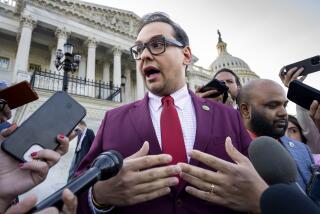Law on Child Pornography Struck Down : Court: A statute used to prosecute a Woodland Hills video distributor for selling films featuring an underage actress is called unconstitutional. His conviction is overturned.
A federal court Wednesday overturned the conviction of a Woodland Hills video distributor for selling films featuring former porn queen Traci Lords when she was a minor, ruling that a federal law against distributing child pornography was unconstitutional.
The U.S. 9th Circuit Court of Appeals ruled 2 to 1 that the 1977 law used to convict Rubin Gottesman was “fatally flawed” because it failed to require knowledge that one of the performers was under age 18.
The law makes it a crime to send or receive by mail certain types of sexually explicit material involving minors. It does not apply to producers of child pornography, who are covered by a separate law.
“A statute prohibiting the distribution of printed or taped materials that does not require some knowledge of the contents of the material violates the 1st (Amendment),” said the opinion by Judge William C. Canby Jr.
The law “potentially applies to all kinds of recipients or distributors of videotapes and magazines,” Canby said. The judge said that it would chill free expression “to render them all (presumed) criminals if one of the performers in a portrayal of sexually explicit conduct is underage, without the distributor’s or recipient’s knowledge.”
Gottesman, 59, operator of X-Citement Video in Van Nuys, was convicted in 1989 of three child pornography charges stemming from his interstate shipment of the video cassette “Lust in the Fast Lane” and several others starring Lords.
During the trial, the mother of the former porn star-turned-mainstream actress testified that her daughter, whose name at birth was Nora Kuzma, was 17 at the time the films were produced.
The disclosure in 1986 that dozens of the sexually explicit films in which Lords starred were made while she was underage rocked the adult film industry, causing distributors to withdraw them from the market for fear of federal prosecution.
Investigators said Gottesman agreed to ship several Lords videos to Hawaii in 1986 and 1987 after being approached by a buyer who turned out to be an undercover Los Angeles police officer.
Gottesman’s lawyer, Stanley Fleishman, said the court ruling struck down “the broad definition of child pornography, which really was a trap for everybody,” adding, “a lot of innocent people are in prison now under this unconstitutional law.”
Gottesman, who was sentenced to a year in jail and fined $100,000, has been free on $175,000 bail, Fleishman said.
Carole Levitzky, a spokeswoman for the U.S. attorney’s office in Los Angeles, said prosecutors had not yet reviewed Wednesday’s decision and would have no comment.
In ruling the law invalid, the court distinguished it from the ban on producing child pornography.
A 1988 ruling by the same court refused to require proof that a producer knew a performer was under 18, but allowed a defense that the performer had deceived producers into believing she was an adult.
Canby, joined by Judge Ferdinand Fernandez, said producers presumably knew or could learn the ages of their employees, a task that might be difficult or impossible for a video store owner or a buyer. Canby said the court was bound by its 1990 ruling that the law did not require a distributor to know that a performer was underage.
Judge Alex Kozinski dissented, contending that the 1990 ruling should not prevent the court from interpreting the law to allow a conviction based on “reckless disregard” for whether a performer was underage.
More to Read
Sign up for Essential California
The most important California stories and recommendations in your inbox every morning.
You may occasionally receive promotional content from the Los Angeles Times.










